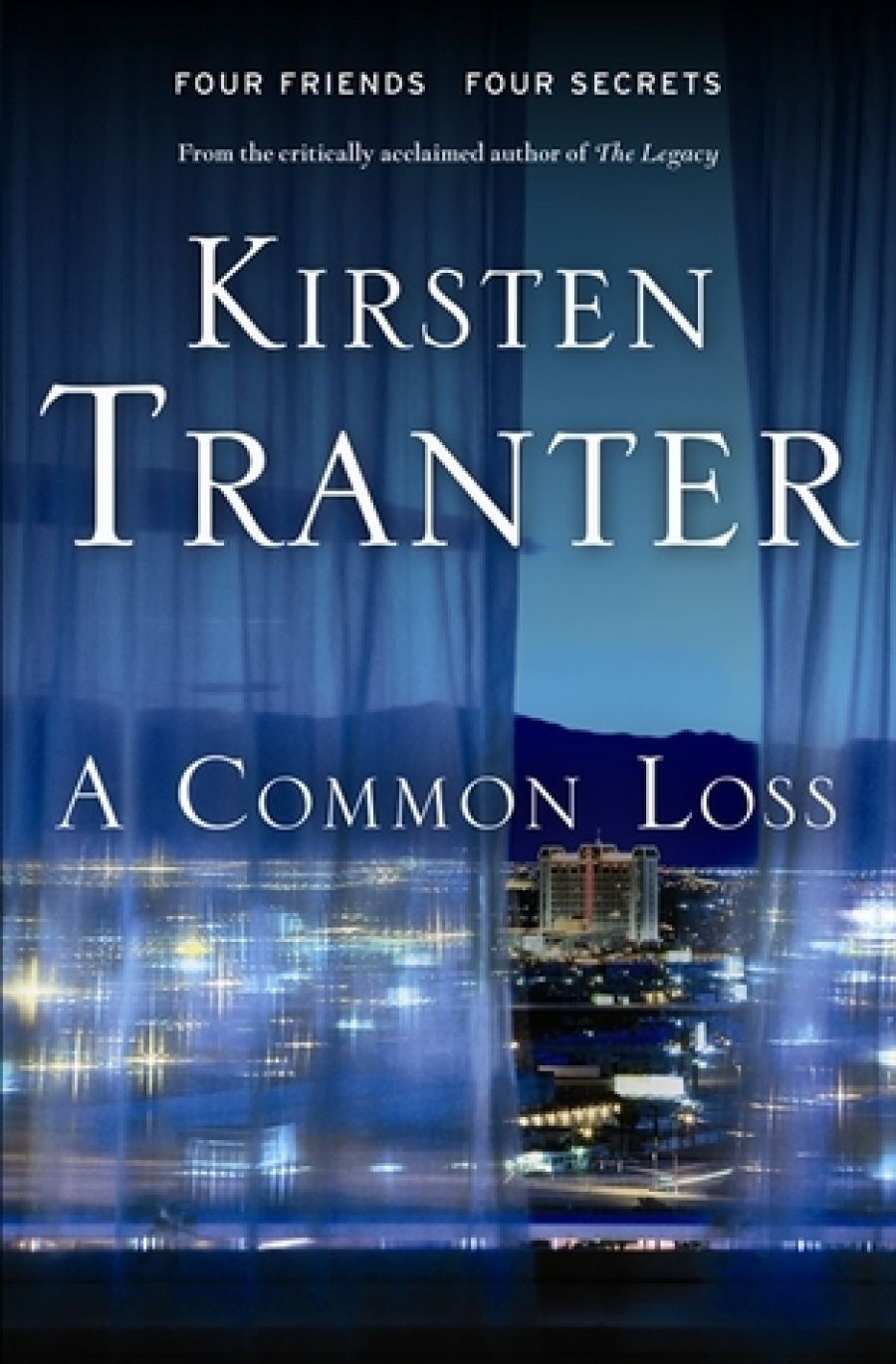
- Free Article: No
- Contents Category: Fiction
- Review Article: Yes
- Online Only: No
- Custom Highlight Text:
It begins with a car accident. Five friends are returning to college after a night of drinking. The driver, Cameron, hits a deer and overturns the vehicle. When the police and ambulance arrive, Dylan, who has drunk the least, claims to have been at the wheel. The others – Elliot, who narrates the story, Tallis, Brian, and especially Cameron – let him assume responsibility. It is, more or less, what Dylan does, what his role in the group is: a mediator, a defuser of tension, a solver of problems. Ten years later, shortly after he is killed in a traffic accident, the details of that night, and other similar instances of Dylan’s particular kind of timely assistance, will resurface as the four gather for their annual reunion in Las Vegas.
- Book 1 Title: A Common Loss
- Book 1 Biblio: Fourth Estate, $29.99 pb, 360 pp, 9780732290825
Kirsten Tranter’s second novel, which follows the much-praised The Legacy (2010), could well have been titled The Bequest,for the charismatic and chameleon-like Dylan has left behind him a stash of papers, a bequest of sorts, that exposes secrets and lays the four open to blackmail. As Tallis says bitterly as they struggle to come to terms with this new picture of their former friend: ‘Basically he’s given a whole lot of information to someone else, who is now fucking with us.’ That someone is also in Vegas, and demanding the proverbial pound of flesh. Each of the four has received an envelope containing details of former misdeeds about which he hoped nobody would ever find out. In each case, Dylan had been the sympathetic facilitator, the one they all turned to for help and who had asked nothing in return. Or so they thought.
On one level, A Common Loss is a compelling psychological thriller. The revelations come gradually, as Elliot, with considerable shock, re-evaluates not only his former friend but also his relationships with the other three men. Of the group, Elliot – an untenured professor of Renaissance Drama at a small East Coast college – is the one least able to contribute a share of the blackmail. At one point someone suggests, not entirely flippantly, that they get rid of their blackmailer by shoving him into the Grand Canyon, and there is a nail-biting reversal-of-fortune scene in a casino that is pure Hollywood. Adding to the tension is the fact that Brian has brought along an outsider to the reunion: his girlfriend, Cynthia, a graduate student who is writing a dissertation on authenticity and imitation. While Cynthia conducts her research amid the casino’s replica Venetian canals, Parisian bistros, and glittering façades, Elliot, in an obvious parallel, is forced to reassess whether his long-time friendships have been based on anything real and genuine.
It is Tranter’s observational skills, elegance of expression, and ability to describe the inner workings of the narratorial mind that elevate A Common Loss to a higher plane than most thrillers. That, and the wealth of literary references. The first comes six pages in with a reference to John Keats; a few pages later, Elliot and Brian first bond over Richardson’s Clarissa. Tennyson’s In Memoriam,an elegy for a dead friend, not only contributes the novel’s title, but is also at the heart of the guilty secret that binds Elliot to Dylan. A larger debt may be to Donna Tartt’s The Secret History (1992), but Tranter gets in first with her opening to chapter two, when Elliot assures us that ‘This isn’t going to be one of those stories about a suburban boy seduced into a picturesque world of wealth and charm by a group of high-class eccentrics.’ Sorry, Elliot, but it so is. Elliot is a rather unreliable narrator anyway, one whose life from college onward has been marked by embarrassment about his own prosaic background and his envy of Dylan’s Hollywood upbringing and glamorous family (‘close to the kind of royalty you’d dream of being descended from as a child’). He worries constantly about his standing in the group, even as he remains ambivalent about whether he wants to attend yet another reunion. ‘I told myself I didn’t like any of them very much any more. Their shortcomings and irritating habits were much more present in my mind than any positive feeling. I supposed I liked the idea of having friends from college more than I really liked the friends themselves.’ The trip to Las Vegas only deepens Elliot’s dilemma and emotional insecurity, and shatters his illusion about being ‘the knowing, insightful one’ in the group.
Reviewing Stephen King’s new novel in the Spectator recently (10 December 2011), Ian Thompson describes him as a writer of genre fiction who appeals to a reading public both popular and serious. ‘Much of what passes these days for literary fiction is mere creative writing,’ he opines, and King never sidelines story. On the basis of her two published titles, the same could be said of Kirsten Tranter. The acute insights into human behaviour and the excellence of the writing – she never writes a dull sentence, and some of them stop you in your tracks – undoubtedly classify her novels as literary fiction, but they are also compellingly good reads. Tranter knows how to structure a mystery and keep readers turning pages. It is a rare and unbeatable combination.


Comments powered by CComment